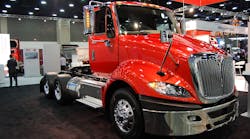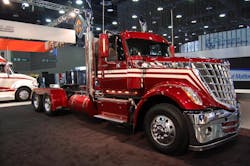The impact of the potential lawsuit announced by the Environmental Protection Agency (EPA) last week against truck and engine maker Navistar over its use of “non-compliant” engines in its 2010-model trucks – engines that did not meet the agency’s exhaust emission standards – is really going to depend on just how big a fine EPA inflicts on the OEM.
Right now, the EPA is planning to levy up to $300 million in fines on Navistar over some 7,750 heavy-duty diesel truck engines sold in 2010 that didn’t meet the agency’s air pollution metrics – roughly equating to a $37,500 fine per engine.
Yet also in play alongside those potential fines is the continued strong pace of the North American commercial truck market, Basili Alukos, an equity analyst with independent investment research firm Morningstar, told Fleet Owner.
“If volumes stay at their current level, they’ll generate the cash needed to dig out from this,” he said. “If volumes fall, then it works against them twice; they are losing revenue even as the costs they need to carry rise.”
To date, the truck sales outlook has become more mixed. Yet Navistar noted in its second quarter earnings report that it believes retail deliveries of Class 6 through 8 trucks and buses in the U.S. and Canada will stay strong in both 2015 and 2016 – in the range of 350,000 to 380,000 units – with a stronger mix of school buses and medium-duty trucks.
If truck sales remain at such a strong pace, Alukos contended, then Navistar should be able to generate the cash necessary to handle the EPA’s fines – whatever that final number turns out to be.“From a revenue perspective, you’re talking about a company generating $10 billion to $12 billion a year, if [truck sales] volumes continue at their current pace,” he explained. “The real question is how it impacts their free cash flow, which is around $700 million to $1 billion. That’s the more meaningful impact.”
According to the company’s second quarter earnings report, filed back at the beginning of June, Navistar has $784 million in manufacturing cash, cash equivalents and marketable securities on hand.
The OEM also reported a net loss of $64 million on revenues of $2.7 billion for the second quarter as well, compared to a net loss of $297 million during the same period in 2014.
The company attributed that significant reduction in its losses to an “increase in truck segment sales, favorable product mix and the continuation of lower warranty expense and cost reductions.”
Furthermore, Navistar noted today that it successfully “refinanced” its $697.5 million long-term line of credit with a new $1.040 billion senior secured term loan that will mature in August 2020.
"The company's financial condition and results continue to improve steadily, and we have begun to generate positive cash flow," noted Walter Borst, Navistar’s CFO, in a statement.
Steve Schrier, a Navistar spokesman, stressed to Fleet Owner that the company did not launch this loan refinancing for the purpose of raising funds for the EPA’s lawsuit, which had not been filed when this transaction was first initiated; a loan that represents an increase of $342.5 million.
"The loan provides us additional liquidity and financial flexibility for the company as we invest in new products and advance on our Uptime strategy in the market, driven by our focus on connected vehicles," Schrier said. "In addition, the term loan renewal extends our debt maturity profile."
Yet Vicki Bryan – a senior high yield analyst at Gimme Credit – told the Springfield News Sun that the EPA’s lawsuit comes “at a bad time for Navistar,” which has “made strides to become more profitable” but still faces a precarious financial situation.
“By the time a settlement is assessed on this issue, which could come over the next year, we expect Navistar will be in even better shape to absorb it without stalling or, worse, reversing its hard-won progress toward recovery,” Bryan told the newspaper.
“We suspect Navistar’s new management is working aggressively to whittle the impact as much as possible, but it’s also important that Navistar get decisively past so much damaging, not to mention expensive, legacy baggage — especially government probes and lawsuits related to this dark period — which continue to impair its credibility with customers, employees, suppliers, lenders and investors,” she added.
At the end of the day, however, it's the reaction by Navistar’s customers to the EPA’s lawsuit that has the longest-term implications, Morningstar’s Alukos told Fleet Owner.
“Are they going to view this as a new, significant challenge for the company’s products? Or to pay for their ‘past sins,’ which is the more likely view,” he explained. “It comes down to how it might affect the view of current product quality.”




